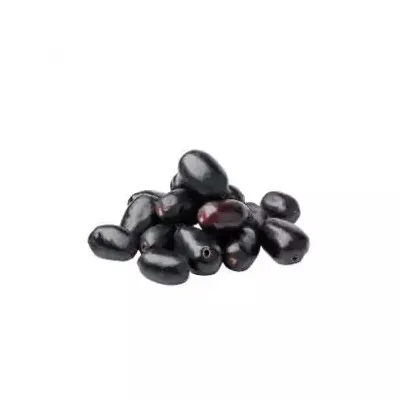



Jamun (or njaval) is an easy-to-grow fruit plant that produces delicious, deep violet-colored berries. They are grown without any significant pest infestation, care, or fertilization.

Pay using UPI, Card or Netbanking

Shipping within 3 working days
Jamun (or njaval) grows well throughout its native India and in Southeast Asian countries such as Thailand, the Philippines, and some parts of the USA. Although not widely cultivated commercially in India, it is grown as a shade tree along with parks, roadsides, government institutions, and commercial complexes as part of community afforestation.
Jamun propagation is usually through seedlings, but grafting and budding are also gaining popularity.
Jamun or Syzygium cumini is a medium-sized evergreen tree that can reach up to 100 feet in height. It can have a wide canopy, due to which it is sometimes used as a shade tree.
It prefers a hot and humid climate and can tolerate a range of soils, including sandy loam and clay. The tree requires full sun exposure to produce fruit; as a matter of fact, Jamun is also used as a shade tree. Jamun seedlings are recommended to plant at a distance of at least 25 feet from other trees. The tree usually survives unattended. However, watering in dry conditions is helpful during the fruiting period.
Jamun is usually not pruned. Graft, bud, and layer jamun plants may be grown in containers; jamun plant seedlings are not recommended to be grown in containers.
The jamun tree flowers in March–April and bears fruit in June. From a single tree, 10–100 kg of jamun fruit are produced,
Jamun berries are round and typically 3–4 cm in diameter. The fruit starts out green and turns dark purple or black when ripe.
Jamun berry is juicy and has a sweet and tangy flavor. The fruit is commonly eaten fresh. Eating Jamun will give a deep violet colour to the tongue for sometime.
Post-harvest, the black violet fruit has a shelf life of only one or two days at normal temperatures. The jamun, washed and sealed in polythene covers, can be stored for up to three weeks.
The seeds are also edible and are often roasted or boiled. Jamun is a good source of vitamins and minerals, particularly vitamin C.
All parts of the jamun tree are useful and have medicinal value. The leaves are bactericidal, and the fruits are used for the strength of teeth and gums and for stomach ailments. Syrup or fruit juice are good for the nervous system and anemia. It is very good for diarrhea and urinary incontinence. Jamun, or njaval fruits, are rich in minerals and vitamins.
In Ayurvedic medicine, jamun is used for treating diabetes, diarrhea, and skin diseases. Jamun has antioxidant properties.
The blue-black color of jamun has been used as a natural dye for fabrics and textiles.
The leaves of the jambolan tree are often used in cooking to add flavor.
The seeds of the jamun are used for treating oral health problems such as gum disease and toothache.
Njaval/Jamun is an important source of food for various birds, bats, and monkeys in the wild.
It is grown as a shade tree.
Data sheet